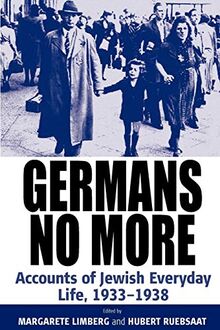
[A] welcome complement to historians' accounts of Jewish reactions to Nazi
persecution before 1939. It richly maps the spatial, emotional and psychological
effects of social abandonment, propaganda and the atomization of everyday life
that made many Jews come to feel what National Socialist policy had always
intended-that they were Germans no more. H-German
In 1940, Harvard University sent out a call to all German-Jewish refugees to
describe their experiences both before and after 1933. These invaluable documents
were only discovered in the University archives some fifty years later by the editors
of this volume. The memoirs, written so soon after the emigration when
impressions were still vivid, movingly and tellingly describe the gradual
deterioration of the living conditions for Jews in Germany in the time period
leading up to the war-the daily humiliations they had to suffer, and their
desperate attempts to leave Germany.
A great deal is written about Nazi Germany during war time, yet little is known
about the years that preceded the war. Based on these collected eyewitness
accounts, and with an informative introduction that places these experiences
within a wider historical framework, this important book sheds new light on this
time period. As this collection powerfully illustrates, these preceding years provide
important clues and insights to the events that took place after November 1938,
culminating in the Holocaust. Any attempt to come to grips with this dark period in
history must take the revelations provided in this book into account.
Margarete Limberg studied political science at the universities of Hamburg and
Berlin. She is working as a broadcaster for German radio in Berlin. Her special areas
of interest are contemporary history and policies in the arts and education.
Hubert Rübsaat studies history, sociology, philosophy, and education at the
University of Cologne. He works as broadcaster for North German radio where he
heads the section on contemporary history and policies in education.
Alan Nothnagle has taught history at the University of Iowa and the Europa-
Universität Viadrina in Frankfurt/Oder. He currently lives and works as a freelance
writer and translator in Berlin.